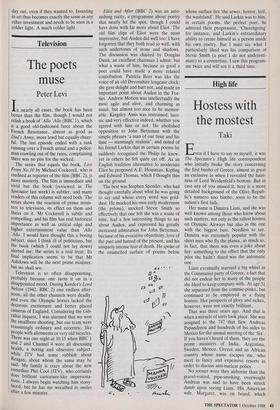Television
The poets muse
Peter Levi
n nearly all cases, the book has been
better than the film, though I would not relish a book of 'Alio 'Alio (BBC 1), which is a good old-fashioned farce about the French Resistance, almost as good as Dad's Army, more lewd but equally cheer- ful. The last episode ended with a tank running over a French urinal and a police- man crawling out of the ruins, complaining there was no piss for the wicked.
The series that equals the book, Live From No.10 by Michael Cockerell, who is credited as reporter of the film (BBC 2), is more masterly. The film is immediate and vivid but the book (reviewed in The Spectator last week) is subtler, and many readers of this column will need both. The series shows the reaction of prime minis- ters to television, its effect on them and theirs on it. Mr Cockerell is subtle and compelling, and his film has real historical Importance as well as critical edge and higher entertainment value than 'Allo 'Alto. I would have thought this a boring subject, since I think ill of politicians, but the book (which I could not lay down) alerted me; the series is a real treat. Its final implication seems to be that Mr Ashdown will be the next prime minister, but we shall see.
Television is so often disappointing, probably because one turns it on in a disappointed mood. During Korder's Lord Nelson (1942, BBC 2) one endless after- noon, all the other channels were deadly, and even the Olympic horses lacked the decorous excitement and better placed cameras of England. Considering the Gib- raltar inquest, I was alarmed that we won the smallbore shooting, but our team were reassuringly ordinary and eccentric, like people with allotments or very old bicycles. There was one night at 10.15 when BBC 1 and 2 and Channel 4 were all discussing health, a boring and obsessive subject, while ITV had some rubbish about Reagan, about whom the same may be said. My family is crazy about the new comedian Phil Cool (ITV), who certainly does brilliant caricature-like impersona- tions. I always begin watching him stony- faced, but he has me wreathed in smiles after a few minutes. Eliot and After (BBC 2) was an asto- nishing rarity, a programme about poetry that nearly hit the spot, though I could have done with far more about Eliot. The old film clips of Eliot were the most impressive, but Auden did well too: I have forgotten that they both read so well, with such undertones of stone and shadows. The discussion was chaired by Douglas Dunn, an excellent chairman I admit: but what a waste of him, because so good a poet could have made a more relaxed contribution. Patricia Beer was like the voice of an old Devonshire longcase clock: she gave delight and hurt not, and made an important point about Auden in the For- ties. Andrew Motion was intellectually the most agile and alive, and charming as usual, but almost too nice to be memor- able. Kingsley Amis was restrained, laco- nic and very effective indeed, whether you agreed with him or not. He abolished opposition to John Betjeman with the simple phrases 'a man of our time and his time — stunningly realistic', and noted of his friend Larkin that in certain poems he suddenly recognised the Philip he knew, yet in others he felt quite cut off. As an English tradition alternative to modernist Eliot he proposed A.E. Housman, Kipling and Edward Thomas, which I thought thin on the ground.
The best was Stephen Spender, who had thought carefully about what he was going to say and whose every word was gold- dust. He mocked his own early modernism (the pylons), mocked Stevie Smith so effectively that one felt she was a waste of time, had a few interesting things to say about Auden, and expressed his greatly increased admiration for John Betjeman, because of his evocative objectivity, love of the past and hatred of the present, and his uniquely intense fear of death. He spoke of the enamelled surface of poems below whose surface lies 'the sewer, horror, hell, the wasteland'. He said Larkin was to him, in certain poems, the perfect poet, he admired their progression, 'Churchgoing' for instance, and Larkin's extraordinary ability to create himself as a person inside his own poetry. But I must say what I particularly liked was his comparison of Stevie Smith (a poet I do not underesti- mate) to a concertina. I saw this program- me twice and will see it a third time.


































































 Previous page
Previous page